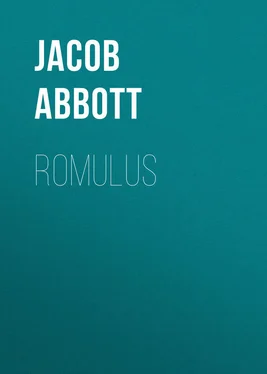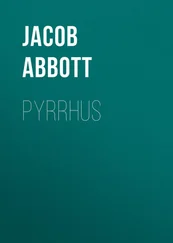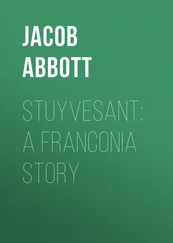Jacob Abbott - Romulus
Здесь есть возможность читать онлайн «Jacob Abbott - Romulus» — ознакомительный отрывок электронной книги совершенно бесплатно, а после прочтения отрывка купить полную версию. В некоторых случаях можно слушать аудио, скачать через торрент в формате fb2 и присутствует краткое содержание. Жанр: foreign_antique, foreign_prose, Историческая проза, на английском языке. Описание произведения, (предисловие) а так же отзывы посетителей доступны на портале библиотеки ЛибКат.
- Название:Romulus
- Автор:
- Жанр:
- Год:неизвестен
- ISBN:нет данных
- Рейтинг книги:3 / 5. Голосов: 1
-
Избранное:Добавить в избранное
- Отзывы:
-
Ваша оценка:
- 60
- 1
- 2
- 3
- 4
- 5
Romulus: краткое содержание, описание и аннотация
Предлагаем к чтению аннотацию, описание, краткое содержание или предисловие (зависит от того, что написал сам автор книги «Romulus»). Если вы не нашли необходимую информацию о книге — напишите в комментариях, мы постараемся отыскать её.
Romulus — читать онлайн ознакомительный отрывок
Ниже представлен текст книги, разбитый по страницам. Система сохранения места последней прочитанной страницы, позволяет с удобством читать онлайн бесплатно книгу «Romulus», без необходимости каждый раз заново искать на чём Вы остановились. Поставьте закладку, и сможете в любой момент перейти на страницу, на которой закончили чтение.
Интервал:
Закладка:
The Trojan war.
Achilles.
At length the Trojan war broke out. For a time, however, Æneas took no part in it. He was jealous of the attentions which Priam, the king of Troy, paid to other young men, and fancied that he himself was overlooked and that the services that he might render were undervalued. He remained, therefore, at his home among the mountains, occupying himself with his flocks and herds; and he might, perhaps, have continued in these peaceful avocations to the end of the war, had it not been that Achilles, one of the most formidable of the Grecian leaders, in one of his forays in the country around Troy, in search of provisions, came upon Æneas's territory, and attacked him while tending his flocks upon the mountain side. Achilles seized the flocks and herds, and drove Æneas and his fellow-herdsmen away. They would, in fact, all have been killed, had not Aphrodite interposed to protect her son and save his life.
Æneas engages in the war.
The loss of his flocks and herds, and the injury which he himself had received, aroused Æneas's indignation and anger against the Greeks. He immediately raised an armed force of Dardanians, and thenceforth took an active part in the war. He became one of the most distinguished among the combatants, for his prowess and his bravery; and being always assisted by his mother in his conflicts, and rescued by her when in danger, he performed prodigies of strength and valor.
Story of Pandarus.
Æneas rescued by his mother.
Her magic vail.
At one time he pressed forward into the thickest of the battle to rescue a Trojan leader named Pandarus, who was beset by his foes and brought into very imminent danger. Æneas did not succeed in saving his friend. Pandarus was killed. Æneas, however, flew to the spot, and by means of the most extraordinary feats of strength and valor he drove the Greeks away from the body. They attacked it on every side, but Æneas, wheeling around it, and fighting now on this side and now on that, drove them all away. They retired to a little distance and then began to throw in a shower of spears and darts and arrows upon him. Æneas defended himself and the body of his friend from these missiles for a time, with his shield. At length, however, he was struck in the thigh with a ponderous stone which one of the Greek warriors hurled at him, – a stone so heavy that two men of ordinary strength would have been required to lift it. Æneas was felled to the ground by the blow. He sank down, resting upon his arm, faint and dizzy, and being thus made helpless would have immediately been overpowered and killed by his assailants had not his mother interposed. She came immediately to rescue him. She spread her vail over him, which had the magic power of rendering harmless all blows which were aimed at what was covered by it, and then taking him up in her arms she bore him off through the midst of his enemies unharmed. The swords, spears, and javelins which were aimed at him were rendered powerless by the magic vail.
Venus is wounded.
Aphrodite, however, flying thus with her wounded son, mother-like, left herself exposed in her anxiety to protect him. Diomedes, the chief of the pursuers, following headlong on, aimed a lance at Venus herself. The lance struck Venus in the hand, and inflicted a very severe and painful wound. It did not, however, stop her flight. She pressed swiftly on, while Diomedes, satisfied with his revenge, gave up the pursuit, but called out to Aphrodite as she disappeared from view, bidding her learn from the lesson which he had given her that it would be best for her thenceforth to remain in her own appropriate sphere, and not come down to the earth and interfere in the contests of mortal men.
Iris conveys her away.
Aphrodite, after conveying Æneas to a place of safety, fled, herself, faint and bleeding, to the mountains, where, after ascending to the region of mists and clouds, Iris, the beautiful goddess of the rainbow, came to her aid. Iris found her faint and pale from the loss of blood; she did all in her power to soothe and comfort the wounded goddess, and then led her farther still among the mountains to a place where they found Mars, the god of war, standing with his chariot. Mars was Aphrodite's brother. He took compassion upon his sister in her distress, and lent Iris his chariot and horses, to convey Aphrodite home. Aphrodite ascended into the chariot, and Iris took the reins; and thus they rode through the air to the mountains of Olympus. Here the gods and goddesses of heaven gathered around their unhappy sister, bound up her wound, and expressed great sympathy for her in her sufferings, uttering at the same time many piteous complaints against the merciless violence and inhumanity of men. Such is the ancient tale of Æneas and his mother.
Single combat between Æneas and Achilles.
At a later period in the history of the war, Æneas had a grand combat with Achilles, who was the most terrible of all the Grecian warriors, and was regarded as the grand champion of their cause. The two armies were drawn up in battle array. A vast open space was left between them on the open plain. Into this space the two combatants advanced, Æneas on the one side and Achilles on the other, in full view of all the troops, and of the throngs of spectators assembled to witness the proceedings.
The charmed life of Achilles.
A very strong and an universal interest was felt in the approaching combat. Æneas, besides the prodigious strength and bravery for which he was renowned, was to be divinely aided, it was known, by the protection of his mother, who was always at hand to guide and support him in the conflict, and to succor him in danger. Achilles, on the other hand, possessed a charmed life. He had been dipped by his mother Thetis, when an infant, in the river Styx, to render him invulnerable and immortal; and the immersion produced the effect intended in respect to all those parts of the body which the water laved. As, how ever, Thetis held the child by the ankles when she plunged him in, the ankles remained unaffected by the magic influence of the water. All the other parts of the body were rendered incapable of receiving a wound.
His shield.
Achilles had a very beautiful and costly shield which his mother had caused to be made for him. It was formed of five plates of metal. The outermost plates on each side were of brass; in the centre was a plate of gold; and between the central plate of gold and the outer ones of brass were two other plates, one on each side, made of some third metal. The workmanship of this shield was of the most elaborate and beautiful character. The mother of Achilles had given this weapon to her son when he left home to join the Greeks in the Trojan war, not trusting entirely it seems to his magical invulnerability.
The meeting of Æneas and Achilles on the field.
The harangues of the combatants.
The armies looked on with great interest as these two champions advanced to meet each other, while all the gods and goddesses surveyed the scene with almost equal interest, from their abodes above. Some joined Venus in the sympathy which she felt for her son, while others espoused the cause of Achilles. When the two combatants had approached each other, they paused before commencing the conflict, as is usual in such cases, and surveyed each other with looks of anger and defiance. At length Achilles spoke. He began to upbraid Æneas for his infatuation and folly in engaging in the war, and especially for coming forward to put his life at hazard by encountering such a champion as was now before him. "What can you gain," said he, "even if you conquer in this warfare? You can never be king, even if you succeed in saving the city. I know you claim to be descended from the royal line; but Priam has sons who are the direct and immediate heirs, and your claims can never be allowed. Then, besides, what folly to attempt to contend with me! Me, the strongest, bravest, and most terrible of the Greeks, and the special favorite of many deities." With this introduction Achilles went on to set forth the greatness of his pedigree, and the loftiness of his pretensions to superiority over all others in personal prowess and valor, in a manner very eloquent indeed, and in a style which it seems was very much admired in those days as evincing only a proper spirit and energy, – though in our times such a harangue would be very apt to be regarded as only a vainglorious and empty boasting.
Читать дальшеИнтервал:
Закладка:
Похожие книги на «Romulus»
Представляем Вашему вниманию похожие книги на «Romulus» списком для выбора. Мы отобрали схожую по названию и смыслу литературу в надежде предоставить читателям больше вариантов отыскать новые, интересные, ещё непрочитанные произведения.
Обсуждение, отзывы о книге «Romulus» и просто собственные мнения читателей. Оставьте ваши комментарии, напишите, что Вы думаете о произведении, его смысле или главных героях. Укажите что конкретно понравилось, а что нет, и почему Вы так считаете.












